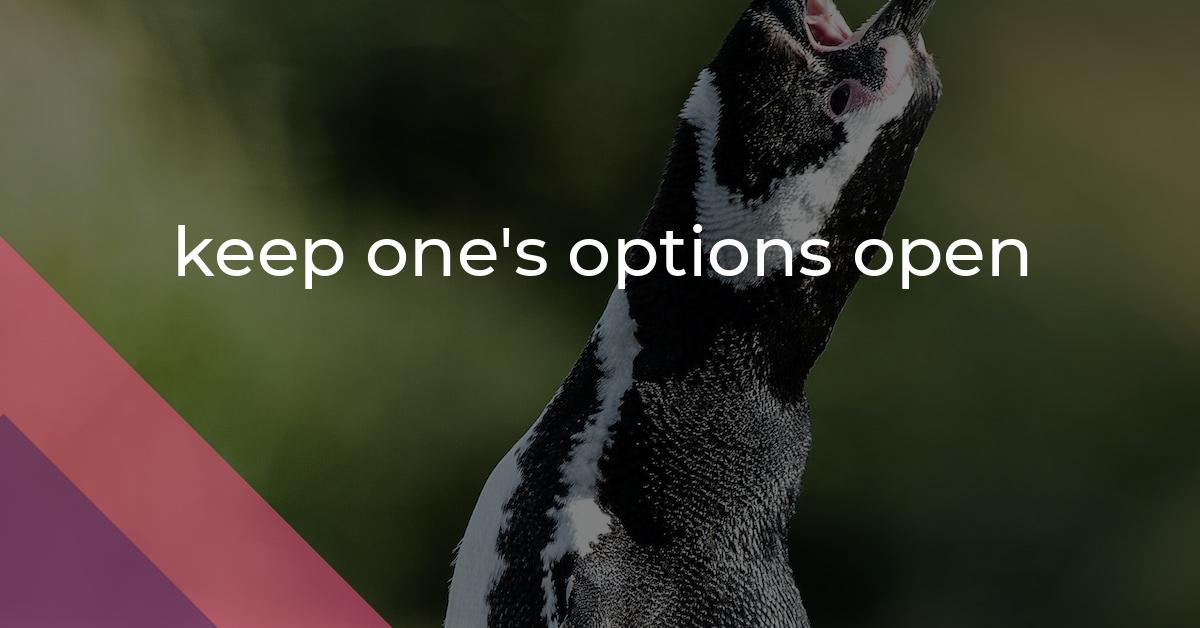keep one’s options open: Idiom Meaning and Origin
What does ‘keep one's options open’ mean?
The idiom "keep one's options open" means to refrain from making a final decision or commitment in order to have the freedom to choose from different possibilities or alternatives.

Idiom Explorer
The idiom "leave the door open" means to keep a possibility or option available. It suggests not closing off or finalizing a decision or course of action, leaving room for flexibility or change in the future.
The idiom "keep someone on their toes" means to keep someone alert, attentive, or prepared for any unexpected situation.
The idiom "keep someone on ice" means to delay or postpone something, typically a decision or action involving someone, usually to wait and see how a situation develops before taking any further action.
The idiom "keep quiet" means to remain silent or not speak, especially when it is important to do so in order to maintain secrecy, avoid trouble, or not reveal information.
The idiom "keep one's pants on" means to remain calm, patient, or to refrain from becoming overly excited or impulsive in a given situation.
The idiom "keep one's mouth shut" means to remain silent or not reveal information, often to avoid causing trouble or trouble for oneself. It emphasizes the importance of not speaking or disclosing something that should remain secret or private.
The idiom "keep one's lips sealed" means to keep quiet or not reveal a secret or confidential information.
The idiom "keep one's head on a swivel" means to remain alert, vigilant, or attentive in order to be aware of one's surroundings and potential dangers or threats. It emphasizes the need to be constantly observant and ready to react quickly.
Option Vulnerability
The idiom "keep one's options open" is commonly used to express a desire or strategy to avoid making a definitive decision or commitment, leaving room for future possibilities or alternative choices. This mindset of flexibility and adaptability emphasizes the importance of remaining open to various alternatives or opportunities. It can be seen as an extension of the natural tendency to weigh the pros and cons of different choices before settling on a particular course of action.
The word "options" in this idiom refers to the range of potential choices or alternatives available to an individual. By choosing to keep one's options open, an individual intentionally refrains from making a firm commitment or decision at a given moment, in order to explore different possibilities or await more favorable conditions. The idiom is often employed in personal relationships, business negotiations, academic pursuits, and career decisions.
In personal relationships, keeping one's options open can indicate a reluctance to commit to a particular romantic partner or a desire to maintain the freedom to explore other potential relationships. This mindset allows individuals to ensure that they are making the best decision for themselves and their future.
For example, when dating multiple people, someone may choose to keep their options open until they find a person with whom they share a strong connection. This approach allows them to get to know different people and explore their compatibility, rather than hastily committing to someone who may not be the best fit for them in the long run.
In business negotiations, the idiom can be used strategically to maintain leverage and bargaining power. By deliberating on potential alternatives and refraining from committing to a specific agreement, individuals or organizations can maximize their position and negotiate more favorable terms.
For instance, imagine a company looking to expand its operations. By expressing interest in multiple locations and considering various investment options, the company can keep its options open and leverage the competition between potential locations to secure the best deal. This approach allows the company to explore different possibilities and make an informed decision based on what will benefit them the most.
Similarly, in academic or career settings, keeping one's options open can convey a desire to consider different opportunities and explore various paths before settling on a specific area of study or professional trajectory. This mindset promotes adaptability and encourages individuals to remain open-minded, ensuring that they do not limit themselves prematurely.
For example, a college student may choose to keep their options open by taking a variety of courses in different disciplines before declaring a major. This approach allows them to explore their interests and strengths, ultimately helping them make a more informed decision about their academic and career goals.
Another related idiom is "leave the door open." This phrase carries a similar meaning to "keep one's options open" and is often used in a personal or professional context. "Leaving the door open" means maintaining a possibility or opportunity for future engagement or involvement.
In personal relationships, leaving the door open can indicate a desire to remain connected or open to reconciliation with someone in the future. It suggests a willingness to keep lines of communication open and potentially rekindle the relationship if circumstances change.
For example, after a breakup, individuals may choose to leave the door open by communicating with their ex-partner and remaining friendly. This approach allows for the possibility of rebuilding the relationship if both parties are willing and circumstances change.
In a professional context, leaving the door open can refer to maintaining a positive relationship with a former employer or colleague. By staying in touch and keeping the lines of communication open, individuals can potentially leverage these connections for future job opportunities or collaborations.
Another related idiom is "keep one's ears open." This idiomatic expression means to listen attentively or stay alert for any relevant information or changes in a given situation.
In personal and professional contexts, keeping one's ears open is essential for staying informed and being receptive to new opportunities or developments. It suggests a willingness to actively seek knowledge and be attentive to potential changes that may affect decision-making.
For example, in a business context, staying informed about industry trends, market conditions, and competitor strategies can help individuals or organizations make more informed decisions and adapt to changing circumstances in a timely manner.
Another related idiom is "keep an eye open." This phrase conveys a similar meaning to "keep one's options open" and "keep one's ears open." It means to be vigilant or watchful, staying alert for any potential opportunities or risks in a given situation.
In personal and professional endeavors, keeping an eye open is crucial for identifying potential opportunities, making informed decisions, and mitigating risks. It emphasizes the importance of being observant and proactive in assessing the situation and taking appropriate action.
For example, in a job search, keeping an eye open involves actively searching for job listings, networking, and being attentive to potential opportunities. By being proactive and vigilant, individuals increase their chances of finding a more suitable job and advancing their careers.
To sum up, the idiom "keep one's options open" represents a mindset of flexibility and adaptability, emphasizing the importance of being receptive to different choices and possibilities. It is commonly used in personal, professional, and negotiation contexts to convey a reluctance to make definitive decisions in order to explore or wait for better opportunities. By keeping one's options open, individuals can maintain flexibility and adapt to changing circumstances or opportunities that may arise in the future.
Example usage
Examples of how the idiom keep one's options open can be used in a sentence:
1. She decided to decline the job offer for now, as she wanted to keep her options open and explore other opportunities.
2. To avoid making any hasty decisions, the company decided to keep their options open and continue evaluating different strategies before finalizing their plan.
3. Although he had offers from multiple universities, he chose to keep his options open by deferring his admission for a year and taking a gap year to travel and gain more experiences.
More "Flexibility" idioms
We missed the mark - nothing found.



